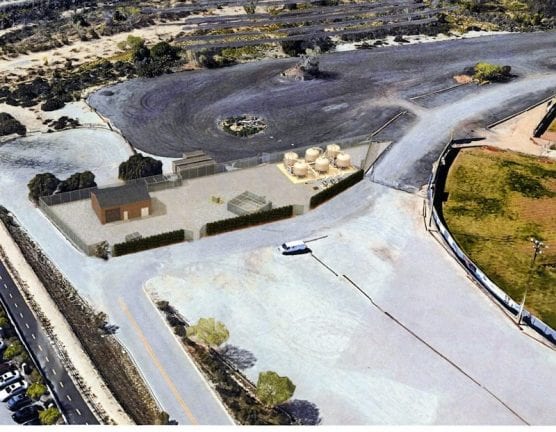Local water officials anticipating tougher state guidelines for a non-stick chemical suspected of being carcinogenic have begun work on a treatment plant next to the William S. Hart Pony Baseball & Softball park to remove the chemical from groundwater in the Santa Clara River.
Officials at the SCV Water Agency found trace amounts last month of a chemical called PFAS, or polyfluoroalkyl substances, in 17 of its wells, requiring them to notify key agencies about the discovery.
The trace amounts were so minuscule that none of wells required being shut down under state-set guidelines.
The day will come, local water officials believe, when the state tightens those guidelines even further, threatening the closure of local wells.
SCV Water board members voiced concern at the last meeting over what to do if state officials lower the threshold for PFAS contamination to such a level that the wells would have to be shut down.
The board decided not to wait for such an announcement and agreed to get the necessary water treatment equipment up and running as soon as possible.
Construction of the PFAS water treatment facility is scheduled to take place between February and June of next year.
Quick start
“This ‘quick start’ project allows us to restore a substantial portion of our water in a short time frame,” Steve Cole, the agency’s assistant general manager, said Monday afternoon.
“We are also structuring a plan throughout our service area to insure we continue to be ahead of this challenge as the new regulatory standards continue to evolve,” he said.
Workers were at the site Monday, drilling at the spot where half a dozen tanks are scheduled to be installed.
Monday’s workers were carrying out a geological survey, “which is needed to engineer the vessels, and the pads they will be sitting on,” SCV Water spokeswoman Kathie Martin said.
“There will be a few preliminary tasks like that occurring, but nothing of impact,” she said.
Construction times
Parents of young baseball and softball players are being advised that most of the work will happen during the regular Monday-to-Friday work week.
In an agency circular titled, “Construction Alert,” agency officials advise the following:
“Weekend and night work may be required. SCV Water will notify Hart ballfields as well as the community prior to work taking place outside of normal construction times.”
All the construction is to happen inside a fenced-off area next the ballpark’s main parking lot.
“Visitors to the ballfields may experience times when some parking is impacted to construction equipment and supply staging,” the Construction Alert circular reads. “If you are visiting the fields during the project, please allow extra time for parking.”
The PFAS water treatment facility is expected to cost about $5 million and treat 6,250 gallons of water per minute. Plans call for six tank-like vessels to be built, along with the necessary pipes, pumps and motors.
CHLORAMINATION
Next to the tanks will be an enclosed building the size of a small house — called a chloramine disinfection facility — to contain the chlorine and ammonia needed to treat the water.
Currently three wells at the site are treated with chlorine only.
“Chloramination — chlorine and ammonia — is a more desirable disinfection process used by SCV Water and other water agencies across the U.S.,” SCV Water officials said in their handout.
They say chloramine stays in the water distribution system longer, produces less disinfection byproducts and has “fewer taste and odor concerns than free chlorine.”
Although there are many industrial uses for PFAS, it’s perhaps most commonly known as the non-stick component that went into making Teflon useful in non-stick pans.
The stricter state guidelines handed down last month are all in response to increasing awareness these past couple of years about the adverse effects of these non-stick chemicals.
The updated guidelines were for local water agencies to follow in detecting and reporting the presence of the two chemicals in drinking water that make up PFAS — perfluorooctanoic acid (PFOA) and perfluorooctanesulfonic acid (PFOS).
Health concerns
Studies indicate that both PFOA and PFOS can have reproductive, developmental, liver, kidney, thyroid and immunological effects in laboratory animals. Both sets of chemicals have caused tumors in animals.
With regards to humans, studies show increased cholesterol levels, liver enzymes and uric acid among exposed populations, with more limited findings related to:
Decreased infant birth weights.
Negative effects on the immune system, including decreased response to vaccinations.
Cancer, for PFOA chemicals.
The PFAS family of chemical was widely manufactured in the U.S. between 1950 and 2015, and the chemicals are primarily used in industrial and consumer products to repel grease, moisture, oil, water and stains.

Construction workers drill into the soil to build a new water treatment facility next to the Wm. S. Hart Pony Baseball; Softball field in Santa Clara River wash Monday afternoon. Cory Rubin/The Signal
Like this:
Like Loading...
Related





 Tweet This
Tweet This Facebook
Facebook Digg This
Digg This Bookmark
Bookmark Stumble
Stumble RSS
RSS



























REAL NAMES ONLY: All posters must use their real individual or business name. This applies equally to Twitter account holders who use a nickname.
0 Comments
You can be the first one to leave a comment.